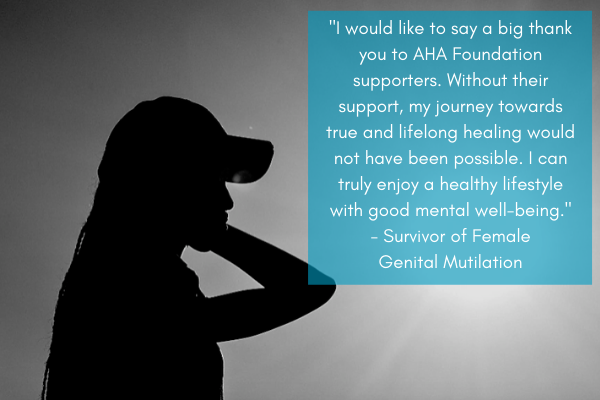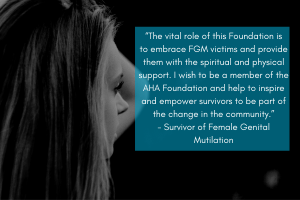AHA Foundation’s Helpline Ensures Girls Seeking Safety From Abuse Are Not Alone

For over a decade, AHA Foundation has worked to achieve its mission by providing direct assistance through our helpline. We offer compassionate and confidential support by providing referrals to professional service providers, including licensed physicians, law enforcement officers, and mental health professionals who are best equipped to address each caller’s individual needs. Survivors and at-risk women and girls seek assistance for a number of issues, including female genital mutilation (FGM) and forced marriage. We are honored to be part of the journey of the women and girls we work with and will continue to act as a vital resource.
Sheriece Hooks has been with the Foundation for a year and a half, and Krista Lofton joined in early 2019. They both earned an M.A. in Clinical Psychology from Pepperdine University in 2017, and are currently pursuing their Psy.D. in Clinical Psychology from Pepperdine as well. Both Sheriece and Krista are passionate about serving women and girls at risk of honor-based violence and educating their peers on topics such as FGM.
AHA Foundation: Can you walk us through your handling of a helpline request?
Krista: Helpline requests come to us via email, which we check frequently throughout the day. Each case is highly unique depending on what the survivor or at-risk individual is facing. Some reach out when they fear they will be taken abroad for a forced marriage, others fear they will be forced to undergo FGM. Depending on what their circumstances are, Sheriece and I work together to create a safety plan for the individual, provide emotional support, and locate resources that are local to the individual and useful for their situation.
We often talk through the different cases we are working on, and brainstorm ways to handle each case to the best of our abilities. Unfortunately, there are few, if any, resources specifically for the traumas and practices we fight against.
 AHA Foundation: When working with survivors and at at-risk individuals, how long does the process usually take?
AHA Foundation: When working with survivors and at at-risk individuals, how long does the process usually take?
Krista: Every case is handled differently based on the individual needs of the person who is connected with the helpline. Our first priority is always safety. We first establish that these individuals are not in imminent harm, and if they are, we advise them to contact local authorities immediately while we continue to work with them. From there, we try to build rapport and establish a personal connection. We take our time in working to better understand what it is that each individual or family is looking for so that we may better address their overall needs. We then try to locate supportive resources that correlate with the challenge at hand.
The length of each case also varies. Sometimes it’s a brief, one-time interaction and referral, and other times, the relationship is much longer. We work collaboratively with the individual to locate resources and provide emotional support in both brief and long-term situations. We make sure to let all survivors know that, even if their journey to safety is complete, Sheriece and I are always available to assist with any new concerns or mental health needs.
“We make sure to let all survivors know that, even if their journey to safety is complete, Sheriece and I are always available to assist with any new concerns or mental health needs.”
AHA Foundation: What advice would you give to a woman or girl who is in need of assistance but is afraid of reaching out to the helpline?
Krista: We would encourage them to find a way to reach out for help. We know that seeking help can often be risky and intimidating, but not seeking help can be worse. We do not force any decisions on those who reach out to us, and we try our best to find resources based on how the individual wants his or her case handled (e.g., criminally, civilly, finding sources of healing such as knowledgeable therapists and doctors, or even identifying various options for emotional support). If a woman or girl is struggling with one of these issues, it is important to us that they know that they do not have to go through it alone.
“We know that seeking help can often be risky and intimidating, but not seeking help can be worse.”
 AHA Foundation: Before joining the AHA Foundation team, did you know about harmful cultural practices like FGM, child and forced marriage, or honor violence? Were these topics covered in your schooling?
AHA Foundation: Before joining the AHA Foundation team, did you know about harmful cultural practices like FGM, child and forced marriage, or honor violence? Were these topics covered in your schooling?
Sheriece: Although I had some awareness about FGM, I would say my knowledge surrounding all of these topics was limited. I had never heard of honor violence, even though I have extensive training in marriage and family therapy. Harmful cultural practices aren’t taught about enough, or even spoken about frequently. I wrote a blog last year about how there is an education gap among mental health professionals on how to treat harmful cultural practices. After reading my blog, one of my professors changed her curriculum to include information on how to handle these situations and how to interact with survivors, it was a small victory but a really meaningful one.
“I had never heard of honor violence, even though I have extensive training in marriage and family therapy.”
AHA Foundation: Can you tell us more about how working at the Foundation and studying clinical psychology at the same time has helped you learn more as a mental health professional?
Sheriece: The issues supported by AHA Foundation are largely unaddressed in my specific clinical psychology program, as well as most of the clinical psychology programs across the country. This is frustrating for me because I help women and girls every day who suffer the mental and physical consequences and I see the need for education on these topics. Since beginning my work at the Foundation, I have made it my personal mission to share my knowledge about harmful cultural practices with peers. Most people respond positively and are interested in these topics.
Krista: Working on the helpline has given me a unique opportunity to apply the skills I have learned to real life situations immediately. Helping the different survivors or at-risk individuals has helped me grow as a mental health professional because it allows me to practice creating relationships and rapport with the women and girls in need. Despite my program’s lack of training specific to these issues, the skills that I have acquired in my doctoral program have allowed me to empathize significantly with those who reach out and respond with warmth and compassion.
“The issues supported by AHA Foundation are largely unaddressed in my specific clinical psychology program, as well as most of the clinical psychology programs across the country.”
AHA Foundation: What have you learned outside of the classroom from working on our helpline?
Sheriece: Working for the helpline while also studying in a mental health program has allowed me to develop a better understanding of how to practice with a global perspective. The helpline has presented challenges such as working through language barriers, understanding how trauma may manifest differently based on culture, nationality, and political context, and has opened my eyes to the crucial need for more programs to protect individuals in developing countries from harmful cultural and political practices. While these issues are also practiced in the U.S. and other Western countries, there are also many more resources and protections for individuals in these countries.
Working on the helpline while being enrolled in a full-time doctoral program has also allowed me to continue to put my skills and knowledge in the service of those in need and balance that work with the needs of school. It has also given me a platform to begin creating change in the education we receive.

